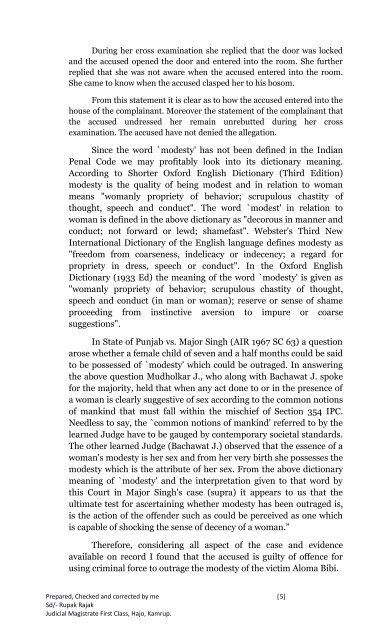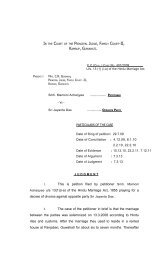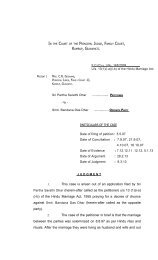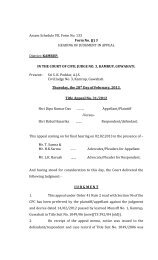Sri Rupak Rajak, JMFC, Hajo,Kamrup
Sri Rupak Rajak, JMFC, Hajo,Kamrup
Sri Rupak Rajak, JMFC, Hajo,Kamrup
Create successful ePaper yourself
Turn your PDF publications into a flip-book with our unique Google optimized e-Paper software.
During her cross examination she replied that the door was locked<br />
and the accused opened the door and entered into the room. She further<br />
replied that she was not aware when the accused entered into the room.<br />
She came to know when the accused clasped her to his bosom.<br />
From this statement it is clear as to how the accused entered into the<br />
house of the complainant. Moreover the statement of the complainant that<br />
the accused undressed her remain unrebutted during her cross<br />
examination. The accused have not denied the allegation.<br />
Since the word `modesty' has not been defined in the Indian<br />
Penal Code we may profitably look into its dictionary meaning.<br />
According to Shorter Oxford English Dictionary (Third Edition)<br />
modesty is the quality of being modest and in relation to woman<br />
means "womanly propriety of behavior; scrupulous chastity of<br />
thought, speech and conduct". The word `modest' in relation to<br />
woman is defined in the above dictionary as "decorous in manner and<br />
conduct; not forward or lewd; shamefast". Webster's Third New<br />
International Dictionary of the English language defines modesty as<br />
"freedom from coarseness, indelicacy or indecency; a regard for<br />
propriety in dress, speech or conduct". In the Oxford English<br />
Dictionary (1933 Ed) the meaning of the word `modesty' is given as<br />
"womanly propriety of behavior; scrupulous chastity of thought,<br />
speech and conduct (in man or woman); reserve or sense of shame<br />
proceeding from instinctive aversion to impure or coarse<br />
suggestions".<br />
In State of Punjab vs. Major Singh (AIR 1967 SC 63) a question<br />
arose whether a female child of seven and a half months could be said<br />
to be possessed of `modesty' which could be outraged. In answering<br />
the above question Mudholkar J., who along with Bachawat J. spoke<br />
for the majority, held that when any act done to or in the presence of<br />
a woman is clearly suggestive of sex according to the common notions<br />
of mankind that must fall within the mischief of Section 354 IPC.<br />
Needless to say, the `common notions of mankind' referred to by the<br />
learned Judge have to be gauged by contemporary societal standards.<br />
The other learned Judge (Bachawat J.) observed that the essence of a<br />
woman's modesty is her sex and from her very birth she possesses the<br />
modesty which is the attribute of her sex. From the above dictionary<br />
meaning of `modesty' and the interpretation given to that word by<br />
this Court in Major Singh's case (supra) it appears to us that the<br />
ultimate test for ascertaining whether modesty has been outraged is,<br />
is the action of the offender such as could be perceived as one which<br />
is capable of shocking the sense of decency of a woman.”<br />
Therefore, considering all aspect of the case and evidence<br />
available on record I found that the accused is guilty of offence for<br />
using criminal force to outrage the modesty of the victim Aloma Bibi.<br />
Prepared, Checked and corrected by me [5]<br />
Sd/- <strong>Rupak</strong> <strong>Rajak</strong><br />
Judicial Magistrate First Class, <strong>Hajo</strong>, <strong>Kamrup</strong>.

















